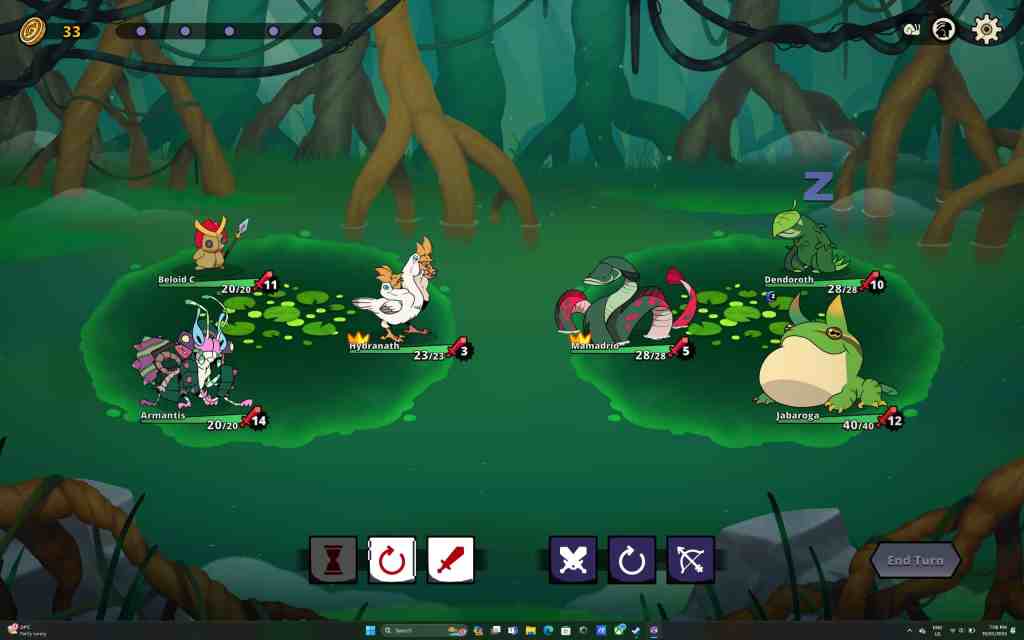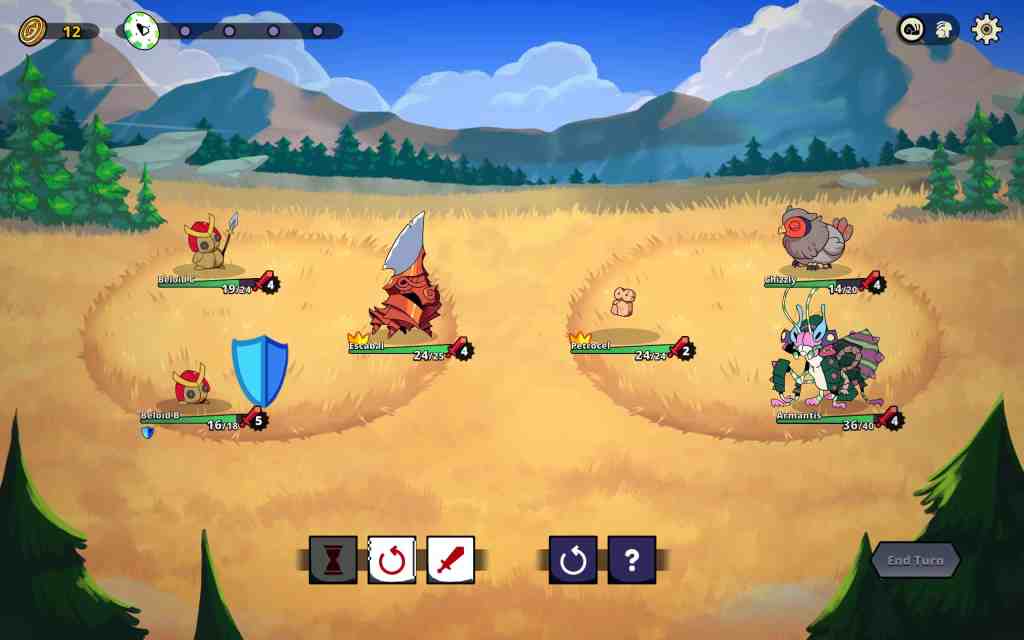Dicefolk is the sort of moreish, snappy game you’ll be thinking about constantly, even after your first rounds end in defeat. It worms its way into your mind subtly, until you find yourself suddenly hankering for another round, another fight, another roll of the dice. Like all good roguelites, it’s a compelling, addictive experience, and one that encourages you to reach further and higher beyond every goalpost.
You begin the game as an inexperienced summoner of chimeras – strange, Pokemon-like magical beasts with the ability and passion for fighting. Your goal is to traverse a loop of terrains, gathering new, more powerful chimeras as you attempt to conquer vast landscapes and defeat a gamut of high-powered bosses.
At first, you have only basic chimeras to fight with, but as you explore various maps, one nodule at a time, you’ll unlock more chimeras, special items, combat advantages, and other improvements that’ll make rounds swifter, and let you explore further – before you’re inevitably felled by a whopping beast in the field.

Death in Dicefolk is just the beginning, as the gameplay is looped in a way that makes defeat its own reward. In each round of the game, you’ll progress through segmented biomes with mounting difficulty, and eventually you will succumb to your wounds – no matter how many healing campfires and battle accessories you find. On defeat, your progress resets, but you earn points that unlock new discoverable chimeras, with these lending more powerful and game-changing abilities.
You won’t always find them in your run, but that’s the joy of adventuring in Dicefolk – you live, you die, you repeat. And every time, you learn more about gameplay strategy, which items can be best exploited in battle, and how to make the most of your attacks. Dicefolk is well-built that way, with a rather clever combat system that rewards investment in the gameplay loop, and persistence even in the face of failure.
Read: Children of the Sun – Preview
As you traverse biomes in Dicefolk, you’ll stumble across an array of unique areas. Some let you nab a new chimera for your team, others are healing spots and shops with items for purchase. There’s also spots with cursed items, spots with blessed items, and other surprises along the way. The most common area you’ll travel through is a battle spot – and it’s in these arenas that Dicefolk makes its strongest impression.

While the game is littered with clever ideas, its shining light is its intricate battle system, which feels incredibly novel in the roguelite space.
In chimera battles, you have access to three moves per turn, determined by the roll of a dice: defence, attack, switching your chimera leader, and other directives. You also have access to the dice of your enemy, and must also deploy their moves to end the combat round.
That clever twist defines the appeal of Dicefolk, and also adds in an excellent layer of strategy – because the timing of moves is just as important as deploying them, and adding enemy movement into the mix makes every turn feel far more tense. You need to calculate who moves when, and why, and whether you can exploit individual chimera abilities to gain more damage.
If you have a defence move you can play, you should shield your leader before deploying an enemy move, ensuring any attack is simply absorbed. If one of your chimeras is low on health, it’s best to rotate them from the leadership position before you fight an enemy, to ensure they reach the next round.
If you manage to nab a chimera with a special ability in your travels – ie. an Escabal, which attacks any enemy that rotates while it’s the leader – you’ll also need to account for these skills, deploying your chimera team in the most effective fashion to pave the way for long-term success.

Strategically placing attacks in a forethought order, playing attention to your chimera abilities and weaknesses, while also monitoring enemy attacks and ensuring you’re defending wherever possible, is a rewarding experience – and while it occasionally comes with frustration, as you can be easily defeated while you’re on a killer run, the fast pace of combat and exploration means picking yourself up and continuing on is simple.
There’s always a new challenge awaiting in a fresh round, and you’ll always find new chimera just over the horizon. And the more you dive into Dicefolk, the more you’ll understand its beating heart, and how best to exploit its mechanics – to the point where you’ll eventually snap up new chimeras and blast through early biomes with ease, wondering why you ever fell at the first hurdle.
While there is a layer of repetition to this fight, by nature of Dicefolk being a roguelite, there is just enough difference and reward in each playthrough (and multiple unlockable stages) to keep the battles feeling fresh and compelling.
With its novel approach to combat, a charming little art style, and plenty of unique mechanics, Dicefolk is a game brimming with personality, and so many reasons to keep rolling its die, and coming back for more.
Four stars: ★★★★
Dicefolk
Platform(s): PC
Developer: LEAP Game Studios / Tiny Ghoul
Publisher: Good Shepherd Entertainment
Release Date: 27 February 2024
The Dicefolk (PC) was provided and played on an ASUS ROG Ally for the purposes of this review. GamesHub reviews are rated on a five-point scale.





